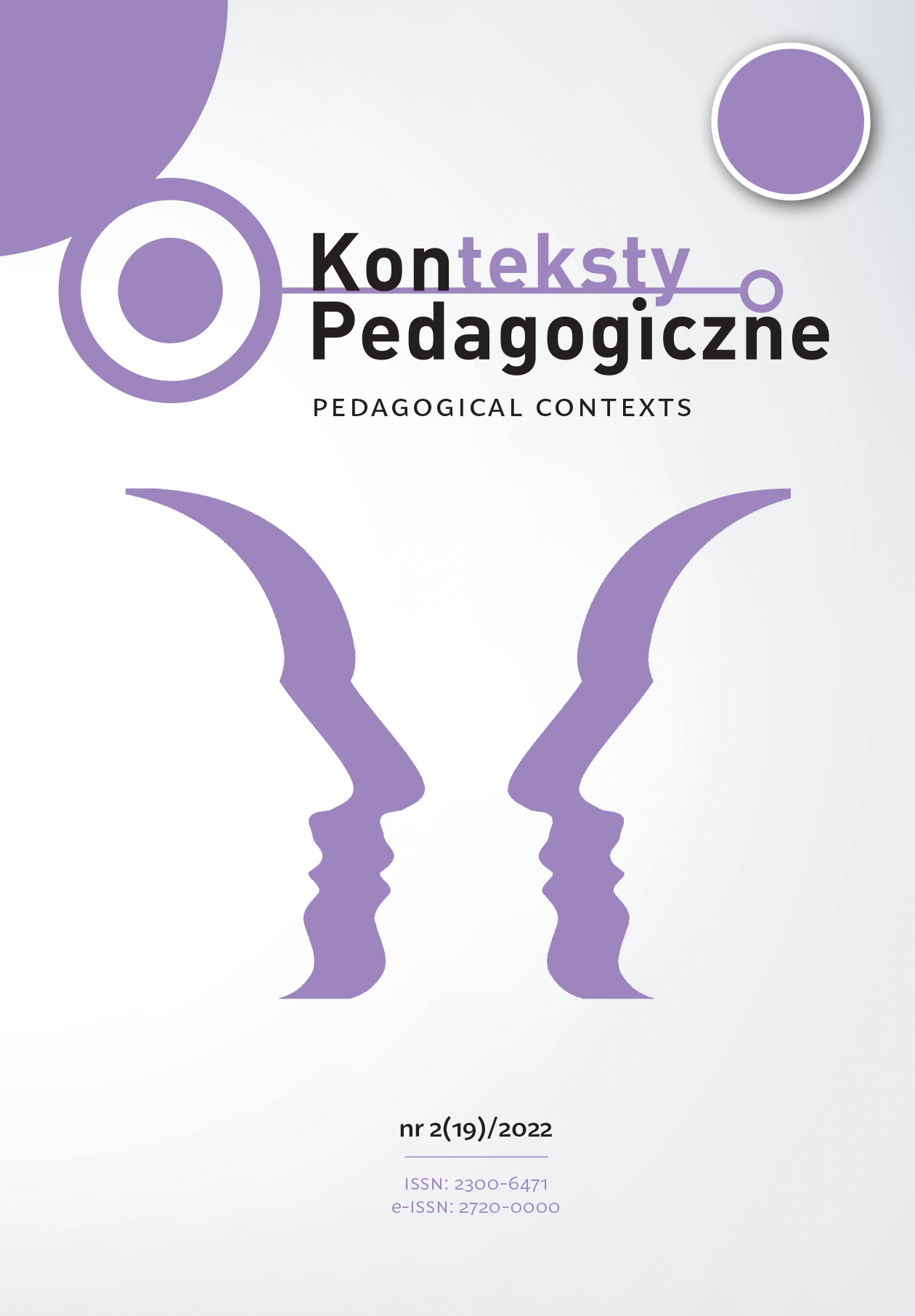Abstrakt
Celem artykułu było opisanie aktualnych możliwości edukacyjnych, rzeczywistości edukacyjnej dzieci i uczniów szkół podstawowych z cukrzycą typu 1 (dalej DM 1) z perspektywy rodziców (opiekunów prawnych*) oraz określenie ewentualnych kwestii problematycznych, które występują w procesie edukacji dzieci i uczniów z DM 1 w przedszkolach i szkołach podstawowych (placówkach szkolnych**) w Republice Czeskiej. Edukacja dzieci z tą poważną chorobą przewlekłą wiąże się z licznymi ograniczeniami i wymaganiami, w szczególności ze zmianą organizacji nauczania, a także z kwestią odpowiedzialności za monitorowanie poziomu cukru we krwi i podawanie insuliny, nastawieniem placówek szkolnych do przyjmowania dzieci z DM 1 oraz ogólnym postrzeganiem warunków edukacji dzieci z DM 1.
W omówionym badaniu ilościowym przedstawiono dane uzyskane dzięki elektronicznemu kwestionariuszowi online, rozesłanemu do przedstawicieli prawnych dzieci z grupy docelowej za pomocą bezpośredniego łącza, które zostało przekazane przedstawicielom prawnym przez zarejestrowane stowarzyszenia rodziców dzieci z DM 1.
Na podstawie uzyskanych wyników można stwierdzić, że warunki edukacji i przyjmowania dzieci z DM 1 w Republice Czeskiej wykazują szereg zmienności w doświadczeniach rodziców w kilku obszarach: podejściu do przyjmowania dzieci do placówek szkolnych, stosowania środków wsparcia w postaci usług doradczych czy wsparcia osobistego, a zmienność doświadczeń przedstawicieli prawnych jest wysoce biegunowa. Może ona również wiązać się z pewnym ryzykiem zarówno dla wychowawców, jak i edukowanych dzieci. Zrozumienie tej specyfiki i zwiększanie świadomości pomogą w ujednoliceniu systemu i podejścia w edukacji, co pozwoli na eliminację potencjalnych zagrożeń dyskryminacyjnych.
Bibliografia
American Academy of Pediatrics (2001). The Role of the School Nurse in Providing School Health Services. Committee on School Health. Pediatrics, 5(108), č. 5, 1231‒1232.
Boledovičová, M., Krištofová i E., Semanišinová, M. (2006). Školská sestra ako komunitná sestra pracujúca v prostrediach škol, http://www.ped.muni.cz/z21/2006/ konference_2006/sbornik_2006/pdf/051.p [dostęp: 1.08.2022].
Cheetz, A. (2007). Why Is the School Nurse Leader Role Important? NASN School Nurse, 8(22), 8‒9.
Derňarová, Ľ. i in. (2021). Potřeby dítěte s diabetes mellitus. Praha: Grada Publishing.
Derňarová, Ľ., Šantová, T., Cinová, J., Šuličová, A., Šimová, Z. i Novotná, Z. (2016). Kvalita života detí s diabetes mellitus 1. typu. W: Evropské pedagogické fórum 2016. Reflexe pedagogiky a psychologie, t. 6 (s. 159‒166). Hradec Králové: Magnanimitas.
Jirkovská, A. (2019). Léčba diabetu inzulínovou pumpou a monitorace glykémie. Praha: Maxdorf.
Kudlová, P. i Chlup, R. (2006). Pomůcky k aplikaci inzulinu. Medicina pro praxi, 6, 298–301, https://www.medicinapropraxi.cz/pdfs/med/2006/06/12.pdf [dostęp: 29.07.2022].
Lebl, J. i in. (2018). Abeceda diabetu. Praha: Maxdorf.
Obermannová, B. i Šumník, Z. (2009). Hypoglykémie u dětí s diabetem 1. typu prevence a terapie. In Medical Tribune, https://www.tribune.cz/archiv/hypoglykemie-u-deti-s-diabetem-1-typu-8211-prevence-a-terapie/ [dostęp: 1.08.2022].
Sdělení MŠMT a MZD k zajištění zdravotních služeb ve školách a školských zařízeních, https://www.edu.cz/sdeleni-msmt-a-mzd-k-zajisteni-zdravotnich-sluzeb-ve-skolach-a-skolskych-zarizenich/ [dostęp: 1.08.2022].
Šimáková, R. (2021). Změny exekutivních kognitivních funkcí u dospívajících s onemocněním diabetes mellitus 1. typu. Disertační práce. Univerzita Palackého v Olomouci, Katedra psychologie, Filozofické fakulty. Vedoucí práce prof. PhDr. J. Mareš, CSc., konzultant: MUDr. D. Neumann, Ph.Dr., https://theses.cz/id/lz46hb/ [dostęp: 1.08.2022].
Šmahelová, A. (2017). Diabetes mellitus a poruchy kognice z pohledu diabetologa. Vnitřní lékařství, 63(10), 717‒720. DOI:10.36290/vnl.2017.142, https://www. casopisvnitrnilekarstvi.cz/artkey/vnl-201710-0020_diabetes-mellitus-and-cognitive-disorders-from-the-diabetologist-s-perspective.php [dostęp: 8.03.2023].
Smith, S.G. i Firmin, M.W. (2009). School Nurse Perspectives of Challenges and How They Perceive Success in Their Professional Nursing Roles. Journal of School Nursing, 2(25), 152–162.
Šumník, Z. i in. (2022) Kompenzace diabetu 1. typu u českých dětí se dlouhodobě zlepšuje: data z národního registru ČENDA (2013–2020). Czehc-Slovak Pediatrics, 77(2), 64–71, https://www.prolekare.cz/casopisy/cesko-slovenska-pediatrie/2022-2-3/ kompenzace-diabetu-1-typu-u-ceskych-deti-se-dlouhodobe-zlepsuje-data-z-narodniho-registru-cenda-2013-2020-130559 [dostęp: 27.07.2022].
Tůma, I. (2007). Diabetes mellitus a kognitivní funkce. Vnitřní lékařství, 53(5), 486–488, https://www.casopisvnitrnilekarstvi.cz/artkey/vnl-200705-0004_diabetes-mellitus-and-cognitive-impairments.php [dostęp: 27.07.2023].
Vehnáčová, J. i Vehnáčová, P. (2006). Akutní komplikace u diabetes mellitus 1. typu. Pediatrie pro praxi, 1, 14–17, https://www.pediatriepropraxi.cz/pdfs/ped/2006/01/03. pdf [dostęp: 27.07.2023].
Vrlíková, D. i Mokáň, M. (2005). Diabetes mellitus 1. typu a autoimunita. Vnitřní lékařství, 51(11), 1297‒1302, https://casopisvnitrnilekarstvi.cz/pdfs/vnl/2005/11/11. pdf [dostęp: 1.08.2022].
Vyhláška 55/2011 Sb. o činnostech zdravotnických pracovníků a jiných odborných pracovníků, https://www.zakonyprolidi.cz/cs/2011-55 [dostęp: 8.03.2023].
Vyhláška 27/2016 Sb. o vzdělávání žáků se speciálními vzdělávacími potřebami a žáků nadaných, https://www.zakonyprolidi.cz/cs/2016-27 [dostęp: 8.03.2023].
Zákon č. 561/2004 Sb. o předškolním, základním, středním, vyšším odborném a jiném vzdělávání (školský zákon), https://www.zakonyprolidi.cz/cs/2004-561 [dostęp: 8.03.2023].

Utwór dostępny jest na licencji Creative Commons Uznanie autorstwa – Na tych samych warunkach 4.0 Miedzynarodowe.
Prawa autorskie (c) 2022 Konteksty Pedagogiczne

